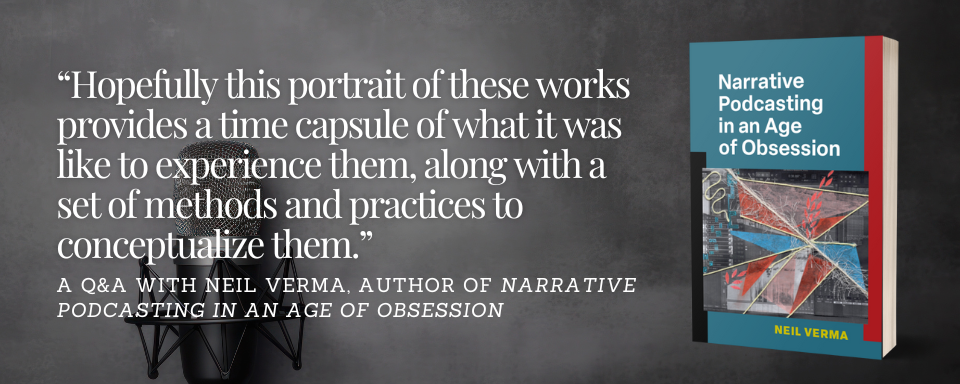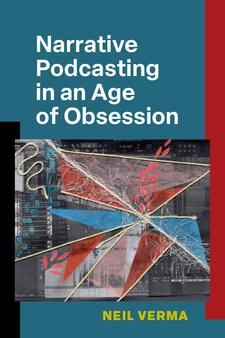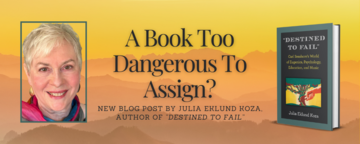Q&A with Author Neil Verma

This is a Q&A with Neil Verma, author of the new book Narrative Podcasting in an Age of Obsession, from the University of Michigan Press. The book is available in hardcover, paperback, and accessible ebook.
Podcasts have been around for years now, and your book focuses on more than 350 podcasts and audio works! When you’re looking at so much material, how do you start organizing your research?
I probably bit off a little more than I can chew! My book explores three main themes: how podcasts seem obsessed with obsession itself; how they wrestle with “structures of knowing,” showcasing their own process of research; and how they have ambivalent relationships with the past, always creating new things, then forgetting them and creating them anew – what I call an aesthetics of amnesia. To get at these themes, in each chapter I begin with a theoretical framework then zoom in on one really specific moment in a podcast, then zoom out to show a dozen variants of that moment in other contexts. Then the process repeats itself. The research works like that, too: close listening, then distant listening, over and over again, until I start to use what I’m finding in the material to redefine the theory that I started with.
In practice, this means many years of taking notes, of listening and re-listening, and lots of post-it notes all over the place. I also attended quite a few podcasting-related conferences, immersing myself in the world of the form for a decade. When I sit down to write, I use large artists’ sketching pads, in order to assemble paragraphs, writing in longhand, and drawing diagrams. Then sometimes I use much more sophisticated tools like pitch-tracking software that isolates vocal work, and spectrograms that express the sound of an episode visually.
It’s a jigsaw puzzle. I think my process works for large bodies of material, where cultural phenomena are either densely packed into a few seconds of narration, or else thinly spread across a large number of works. My models for this work come from literary studies that look at stories, novels or folk tales in their hundreds or more. And I’m used to working this way – my first book drew on more than 6,000 individual broadcast radio plays from the classical radio era. I wouldn’t say this method is philosophically superior to other approaches, but it’s the thing that I do best.
Do you have a favorite podcast (or category of podcasts) to listen to?
I find it hard to judge podcasts based on the standards like artistic merit, entertainment, or journalistic insight. The question of whether a show is “good” or “bad” flummoxes me; I’m better at figuring out what’s “interesting” about a particular show or episode in its context, at identifying its structural tensions and key choices. I’m always looking for what makes a podcast “good to think with.”
That said, I’m a consumer, too, and I’ve been excited by podcasts that work slowly, break rules about pacing, or linger in spaces for longer than they are supposed to. I love audio dramas that are recorded outside of the studio setting, messily, because it introduces a feeling of life to the performances. I think that investigative podcasts are really compelling when they approach the relationships between a subject, story, creator and audience in a pensive way, aware of all the asymmetrical and subtly political aspects of those relationships, particularly when those asymmetries cross race, class, sexuality and gender. I worry that there are fewer podcasts taking risks, that there are fewer narrative podcasts overall, and that not enough podcasts actually reflect on the material conditions of their own possibility.
Some favorite podcasts lately have been You Didn’t See Nothin by the Invisible Institute, Mother Country Radicals from Crooked Media, Shocking, Heartbreaking, Transformative by Radiotopia, and Harlem and Moscow by the Grio. I’m excited for Shima Oliaee’s new podcast The Competition and for Jeffrey Gardner and Eleanor Hyde’s World Gone Wrong. I’m also very interested in the work that Audio Flux has been doing lately.
What surprised you the most when writing the book?
How old the podcasts feel. The works I wrote about for this book circulated from about 2014 to the pandemic, which isn’t all that long ago in the grand scheme of things, but if you listen to them now it’s obvious that they belong to a different cultural moment than the one we live in now. I’d guess that not a single one of them would be made in the same way today.
The field moved so fast in this era, and although some structures were clearly shared across podcasts (that’s what the book tries to identify, after all), the churn was breathtaking. Whole companies were invented, flourished, sold and dissolved, whole genres invented and turned upside down. Many very interesting podcasts had only one season, while others were canceled despite enormous popularity. I think the period from Serial to COVID is already a thing of the past, and one goal of the book is to chronicle what that period felt like.
What do you hope readers will take away from Narrative Podcasting in an Age of Obsession?
A few things. I hope they get a sense of the cultures and tensions that surrounded podcasting at this crucial moment of initial rise, and how narrative structures played into that definitional moment. I hope they see how delicately crafted audio can be, and begin to think about audio in the same close, critical way that we routinely approach images, films and texts. I hope they think of this book as a challenge to turn the page on one era and create works that will define the next.
Many of my students have heard no podcasts from this period, and this book is for them. It is also for future media historians. Who knows how many of these podcasts will even be available in ten, twenty or thirty years? Hopefully this portrait of these works provides a time capsule of what it was like to experience them, along with a set of methods and practices to conceptualize them.



